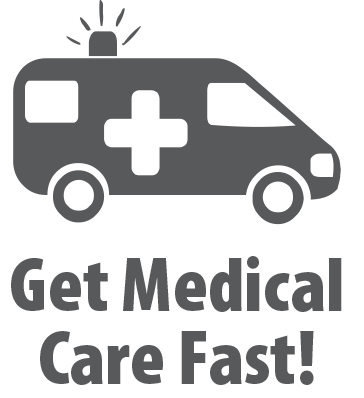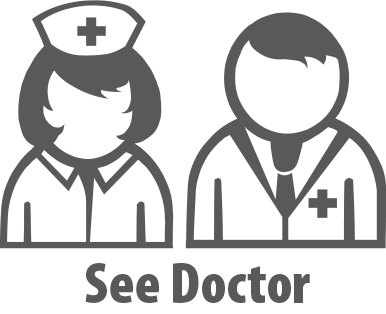General Health Conditions
Fatigue
With fatigue, a person is tired, weary, and lacks energy. Often, fatigue is a symptom of another health problem.
Signs & Symptoms
• Feeling drained of energy.
• Feeling exhausted.
• Having a very hard time doing normal activities.
• Having low motivation.
• Feeling inadequate.
• Having little desire for sex.
Causes
Causes that need medical care include anemia, depression, heart disease, low thyroid, lupus (the systemic type), and chronic fatigue syndrome (CFS).
Other physical causes include: Lack of sleep; poor diet; side effects of medicines; allergies; drug or alcohol problems; being in hot, humid conditions; and the flu.
Possible emotional causes are burnout, boredom, and a major life change, such as divorce or retirement.
Treatment
Treatment depends on the cause. Tell your doctor about any other symptoms that occur with the fatigue. He or she will explore both physical and emotional causes.
Questions to Ask
Question
01
With fatigue, are any heart attack warning sign present?

Get medical care without delay. If symptoms are life threatening go to the ER or call 9-1-1. Don’t call 9-1-1 or use the ER if symptoms do not threaten life. Ask your doctor ahead of time where you should go for a problem that needs prompt care, but not emergency care.
x
Question
02
With fatigue, do you feel lightheaded; faint; or have a loss of balance or weakness, especially in one part or one side of the body?

Get medical care without delay. If symptoms are life threatening go to the ER or call 9-1-1. Don’t call 9-1-1 or use the ER if symptoms do not threaten life. Ask your doctor ahead of time where you should go for a problem that needs prompt care, but not emergency care.
x
Question
03
With fatigue, do these signs occur?
• The whites of your eyes and/or your skin looks yellow.
• Nausea and vomiting. Abdominal pain.
• Fever.
• Stools are pale and clay-colored.
• Dark-colored urine.

You should be seen by your doctor for medical advice. Contact your doctor or health care provider to find out how soon you should be seen.
x
Question
04
With extreme fatigue, do you have any of these signs?
• Fever, sore throat, and swollen lymph glands in the neck area.
• Muscle pain for more than 2 weeks, flu-like symptoms, insomnia, and headache.

You should be seen by your doctor for medical advice. Contact your doctor or health care provider to find out how soon you should be seen.
x
Question
05
With fatigue, do other signs of depression occur?

You should be seen by your doctor for medical advice. Contact your doctor or health care provider to find out how soon you should be seen.
x
Question
06
With fatigue, do any of these signs and symptoms of lupus occur?
• Joint pain for more than 3 months. Fingers that get pale, numb, or uncomfortable in the cold. Mouth sores for more than 2 weeks.
• Low blood counts from anemia, low white-cell count, or low platelet count.
• A “butterfly-shaped” rash on the cheeks for more than 1 month. Skin rash (raised patches with scaling) after being in the sun.
• Pain for more than 2 days when taking deep breaths.

You should be seen by your doctor for medical advice. Contact your doctor or health care provider to find out how soon you should be seen.
x
Question
07
With fatigue, do you have any of these signs?
• Passing urine often. Increased thirst and hunger. Rapid weight loss or you gain a lot of weight.
• Extreme irritability or drowsiness. Itching and/or skin infections that don’t clear up easily. Hair loss and dry, thick, flaky skin.
• Less tolerance to cold temperatures and numbness in the hands.
• Blurred vision, double vision, or the loss of vision in one eye.

You should be seen by your doctor for medical advice. Contact your doctor or health care provider to find out how soon you should be seen.
x
Question
08
With fatigue and weakness, do signs and symptoms of anemia occur?

You should be seen by your doctor for medical advice. Contact your doctor or health care provider to find out how soon you should be seen.
x
Question
09
With daytime fatigue, do signs and symptoms of sleep apnea occur?

You should be seen by your doctor for medical advice. Contact your doctor or health care provider to find out how soon you should be seen.
x
Question
10
Do any of these conditions describe the fatigue?
• It occurred for no apparent reason, lasted for more than 2 weeks, and has kept you from doing your usual activities.
• It started after taking medicine.
• For a female, it hits hard right before or after each monthly menstrual period.
• Pregnancy is possible.

You should be seen by your doctor for medical advice. Contact your doctor or health care provider to find out how soon you should be seen.
x
Self-Care / Prevention
• If fatigue is due to a medical problem, follow your doctor’s or health care provider’s guidelines for rest, diet, medication, etc.
• Get regular physical activity. Exercise can give you more energy, especially if you sit all day at work. Exercise can calm you, too.
• Cool off. Working or playing in hot weather can drag you down. Rest in a cool, dry place as often as you can. Drink plenty of water.
• Avoid too much caffeine and alcohol.
• Don’t use illegal drugs.
• Lighten your work load. Assign tasks to others when you can, both at work and at home. Ask for help when you need it from family and friends. Hire help if you need to.
• Change your routine. Try to do something new and that you want to do every day.
• If you do too much, make time for some peace and quiet.
• Do something for yourself. Plan time to do things that meet only your needs, not just those of others.
Resources
Treating Chronic Fatigue Syndrome & Fibromyalgia

Download an offline pdf file.
RELATED ARTICLES
<
>
2021 © American Institute for Preventive Medicine - All Rights Reserved. Disclaimer | www.HealthyLife.com








